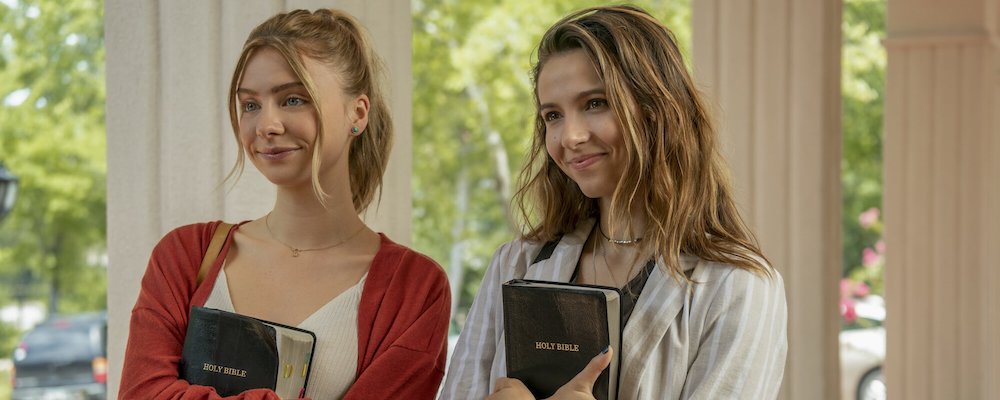Netflix’s ‘Teenage Bounty Hunters’ Energetically Rebels Against Religious Rules of Conduct
Alci Rengifo
Some shows take on the personality of troublemakers, unashamed of provoking, insulting with gusto and wearing their heart on their sleeve. Netflix’s “Teenage Bounty Hunters” has a premise preposterous on paper, but surprisingly alive on screen. Nothing is sacred to this series, whether it be God or your parents, instead it proceeds like a TV arsonist, wickedly burning it all down with cutting satire.
Two twins, Sterling (Maddie Phillips) and Blair (Anjelica Bette Fellini) Wesley attend a Christian private school in Atlanta, where losing your virginity can become quite the scandal. Sterling is the apple polisher, going so far as to become the school’s official worship leader, while Blair prefers to break the rules. Their family is privileged within a typically gated suburban world. Sterling initiates a cycle of events one night during a double date, when she decides to have sex with boyfriend Luke (Spencer House). Then a near car wreck on the sisters’ way back home brings them into the orbit of Bowser Jenkins (Kadeem Hardison), a bounty hunter pursuing the very man who the siblings nearly crash into. Because the girls happen to be sporting a shotgun kept in their stepdad’s truck, Jenkins mistakes them for fellow bounty hunters and offers to split the reward. Thus begins a twisted semi-partnership. This will be a colorful background to the girls’ lives at the Christian school, where Bowser’s rise as worship leader brings her into conflict with April Stevens (Devon Hales), a jealous zealot.
“Teenage Bounty Hunters” is the latest creation of Jenji Kohan, still best known for giving the world “Orange is the New Black.” This new bit of television mayhem is a hilarious romp but also a sharp satire. Kohan and her team of writers-directors do not merely roast the conservative, suburban Christian world of Sterling and Blair, but use it for biting social critique. American Protestantism has its own, unique culture and flavor, particularly in upper middle class America where affluence goes hand in hand with Victorian attitudes. A lesser team of writers would have used the virginity angle for raunch, but instead with an anthropological eye the show turns this into an endearing dilemma. Sterling realizes she enjoys sex with Luke, who is a likeably empty-headed loaf, and attempts to use her experience to bring a sex positive attitude to campus. When she seduces Luke in his jeep, she even uses Bible verses to with an erotic accent to convince him. Blair is convinced it would be ok to go all the way, if her own dim lightbulb of a boyfriend at least professes true love. For the average Gen Z viewer hailing from the secular halls of hook-up culture, this may all seem overdramatic. But nothing rings false about the environment of the campus, where the students raised within this culture genuinely believe in it. We are all products of our environments. Some begin to ask questions, have experiences, and break out, like the siblings at the center of this show. There is something rather original in a teen show where disaster looms because April found someone’s used condom wrapper. She also believes sex workers deserve to have a sense of safety, but not the right to vote.
The show does remain true to its title, so expect comic action sequences, chases and a few oddball shootouts. Surprisingly enough, Bowser’s storyline feels like a convenient or imposed departure from the more entertaining Christian school material. It’s as if Netflix would only do the show if it had an action component, assuming audiences have little interest in following around two sisters in a religious campus. Kadeem Hardison is great fun as a kind of surrogate father figure to the sisters, teaching them how to bust down motel doors and chase down fugitives. He also adds two of the season’s great personal trials when one of his targets happens to be April’s father, who also happens to hang out at a racist country club, a second fugitive will strike even closer to home for the sisters. But Bowser is an action persona dropped into what amounts to a gleefully vicious social satire. The action scenes are adrenaline-pumped, and the two leads would fit well in a Jerry Bruckheimer production, but it feels like fun decoration.
Maddie Phillips and Anjelica Bette Fellini pull off the hard task of being exuberant, while not making their characters look cartoonish. What they accomplish are dual personalities that ring true to teenage life. They are good students and questioning youth, but infused with a religious upbringing. This is one of the rare new shows to touch on an important culture of American life that rarely gets a proper place in popular entertainment. Sterling and Blair can’t just rebel the old fashioned way, even if their parents are two suburban clods who only care about appearances, because in their conscience is the religious order of their lives. Sterling will nervously reveal to her worship group that she’s having sex with Luke, but everyone just laughs. They all think it just has to be a joke.
Filmed with energy, “Teenage Bounty Hunters” is edgy in a fresh way. It has sex and guns, but not as the main point of what it’s doing. In the same way “Orange is the New Black” was never just about prison life, this show is not at all about catching bounties. It’s about being different within an enclosed society, and how seeking pleasure can be revolutionary in a place where feeling good for its own sake is dangerous.
“Teenage Bounty Hunters” season one begins streaming Aug. 14 on Netflix.

